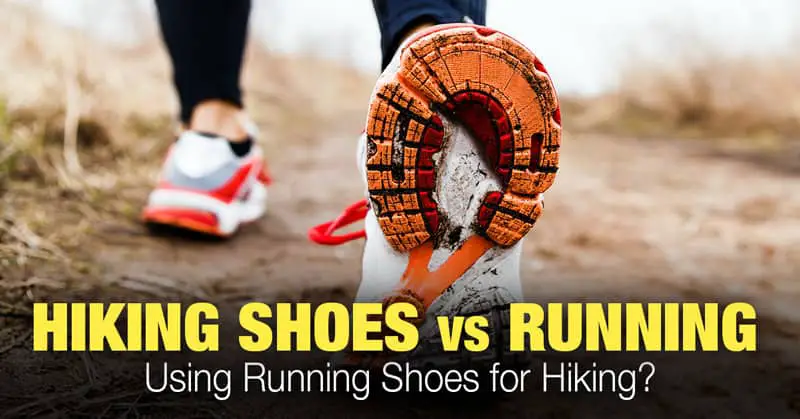If you are looking to understand hiking vs running shoes and if you can use running shoes for hiking, you’ve come to the right place.

Don’t fall for those marketing campaigns, just because it says so on the packaging doesn’t mean it’s true. Hiking boots just because they are called as such, are not necessarily ideal for hikes, whereas running shoes though coming with their benefits, could too be perfectly fittingly.
See also: Best Hiking Sling Backpacks
For a moment though, forget trekking in the mountains or whatever for a moment. Just living day to day, from home to work, then back and everything in between; the importance of comfortable shoes can’t be stressed enough. You’d be surprised how much difference a good pair of shoes can make in your life; double shifts, running, hiking and then some, essentially it’s all about taking that first step out the front door.
As for our hiking and running compadres, the durability, built, ankle support, water protection, and comfort, are some of the must-have when investing in a new pair of shoes.
Time and time again, we hear the same old argument, hiking shoes or running shoes, what’s overall the best?
See also: Ultralight Backpacking Knife
We often hear people wearing running shoes for hiking and vice versa, it could be an individual thing, but looking at the pros and cons of both can definitely give us better clarity to make a better judgment. In this article, we will dig deeper into the benefits and features of both the types of shoes, and determine how each can benefit and add value to your life.
Benefits of Using Running Shoes for Hiking
Better Weight Distribution
It’s a well-known fact, the weight you carry on your feet is like three to five times over on your back. So, if you are rocking a matte black vintage 3-pound hiking boots, substituting for a 1-pound pair of sleek running shoes is definitely a step up. Lighter weight on your feet means better movement and energy conservation. It’s even backed up by a scientific study.
No Agonizing Blisters
Since there is no breaking in needed, and the inner sole and walls of running shoes are comfortingly padded, it’s easy to just put on a pair of running shoes and get to a hike right away. The break-in period is little to non-existent, unlike hiking boots that require a certain time period to adjust to the build of your feet.
See also: Top Rated Packable Daypacks
Lightweight Equals Less-Fatigue
Since running shoes made with lighter material marking a stark difference between hiking boots and running shoes. The benefit of lighter footwear is not just limited to your back, the firmer grip and athletic freedom that comes with running shoes allow greater movement. On top of that, you also tireless fast, then you would when wearing actual hiking shoes.
Since you already have a lot on your back, when you go on a hiking trip, the least you could do is add less weight to your feet. And running shoes do just that as they have soft and flexibles soles, that compliment your movement as well protect you against all sorts of debris.
See also: Backpacking Camp Chairs
In addition, the materials from which running shoes are built are quite light, so even though they are not waterproof, they dry pretty quick, which kind of makes up for the whole offering complete water-proofing claims made by big hiking boots companies.
Benefits of Using Hiking Boots for Hiking
Long Lasting and Durable
Whereas you must get a new pair of running shoes every 3 months maybe at best, if you hike frequently, a good pair of hiking boots are in it for the long haul.
Hiking shoes, on the other hand, are dedicated to this cause; designed to withstand different landscapes, terrains, and surfaces, Hiking boots can endure some very tough times with you.
See also: Best Backpacking Tent Brands
Where you have to buy three to four pairs a year, invest in quality hiking boots and you are set for years.
Waterproof and Can Withstand Extreme Weather Conditions
Hiking boots offer the necessary built to combat things like water, mud and other natural elements. They are made of special material that keep the water from pouring into the boots. You know, if you have a pair on, a surprise downpour won’t be much of a problem. You can run through puddles breaking no sweat.
See also: Best Hydration Bladder for Backpacking
However, it is true there is no such thing as complete waterproofing, water can stream down your pants or legs into boots or hiking shoes can of course over a long period of time develop tiny holes.
Better Protection
Hiking shoes often boast of complete protection of your feet including great ankle support and more. These boots are made from dense materials that offer proper support when you find yourself running across a rocky passage. With high-top designs, Hiking boots also give the wearers better ankle support so that your feet are properly sage against potential sprains and/or damages.
See also: Ultralight Poncho for Backpacking
Where hiking boots lack on weight, it makes up in the protection of your feet. You don’t want a weekend trip turning into a three-month work-from-home situation.
